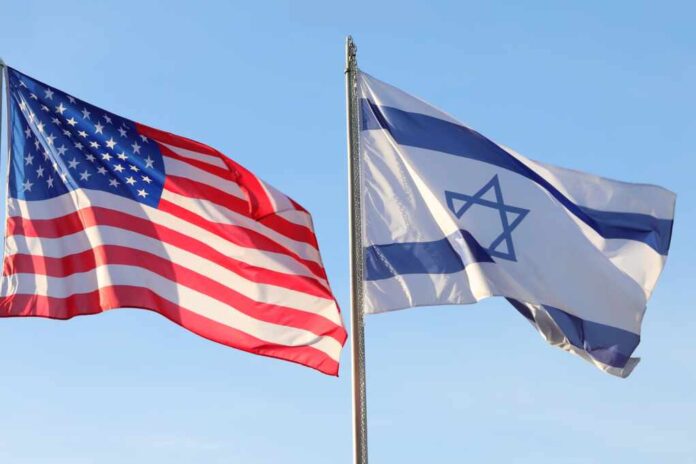
Israel is pushing for an unprecedented 20-year security pact with the U.S. that would lock in billions in taxpayer-funded aid until 2048, more than doubling the length of prior deals. While proponents argue the “America First” agreement—which emphasizes joint defense research—benefits both nations, the proposal has sparked fierce domestic debate in the U.S. over fiscal responsibility, congressional oversight, and the true cost of another multi-decade foreign entanglement.
Story Highlights
- Israel seeks an unprecedented 20-year U.S. security agreement, doubling the standard duration of past deals.
- The pact would shift aid toward joint U.S.-Israeli defense technology research, not just direct military assistance.
- “America First” provisions are included to address growing U.S. demands for reciprocal benefits and domestic focus.
- Negotiations are in early stages, facing scrutiny from both Israeli and American political factions.
Israel’s 20-Year Security Pact Bid: A Major Shift in U.S. Aid Policy
In November 2025, Israeli officials confirmed that negotiations are underway for a 20-year U.S.-Israel security agreement—twice as long as any prior deal. This proposed pact would extend military and technological cooperation through 2048, coinciding with Israel’s centennial. For decades, the U.S. has provided Israel with robust military aid via 10-year Memoranda of Understanding, a cornerstone of bilateral relations since the 1970s. The current MOU, signed in 2016, guarantees $3.8–$4 billion annually through 2028, with most funds spent on U.S.-made equipment. This new proposal signals an unprecedented commitment, with Israel seeking to cement American support for another generation.
Negotiations come at a time when American voters—especially constitutional conservatives—are increasingly wary of endless foreign entanglements and unchecked spending. The Trump administration’s rise and “America First” priorities have forced allies to demonstrate clear reciprocal benefits. Israel’s new approach emphasizes joint U.S.-Israeli research and development in defense technology, not just direct military aid. Proponents argue this shift would benefit the U.S. defense industry and keep American innovation at the forefront, but questions remain about whether long-term agreements tie America’s hands and erode congressional oversight.
🚨 JUST IN: Israel wants a 20-year U.S. military aid deal, doubling the usual term and boosting the current $3.8B a year.
Critics say it’s the opposite of “America First” as U.S. taxpayers already funded $21B+ for Israel after Oct. 7. https://t.co/vzrIDJ0BtS pic.twitter.com/njvr195BC7
— Re:Public (@realrepublicus) November 14, 2025
Domestic Debates: Accountability, Oversight, and Political Divides
Critics in Congress and among grassroots conservatives warn that another multi-billion-dollar, decades-long commitment risks repeating past mistakes—undermining fiscal discipline and constitutional checks. The proposal’s “America First” language attempts to address these concerns by pledging mutual economic and technological gains. Yet, domestic debate intensifies as Americans grapple with the fallout of years of inflation, government overreach, and foreign policy misadventures. The story breaks amid heightened scrutiny of Israel’s actions in Gaza, with U.S. politicians facing pressure from both pro-Israel and skeptical constituencies. The Biden administration’s continued support for Israel has fueled polarization, while Israeli Prime Minister Netanyahu publicly denies seeking new dependency, even as officials confirm ongoing talks.
Some analysts warn that a 20-year deal could reduce U.S. leverage over Israeli policy, binding future American governments to commitments that may not reflect changing realities. Others contend that joint research could yield advances in missile defense, artificial intelligence, and other critical fields. Still, the question for conservatives remains: will this agreement put America’s interests and constitutional limits first, or will it simply entrench another endless aid package?
Long-Term Impact: Security, Sovereignty, and the American Taxpayer
If enacted, the 20-year pact would lock in U.S. support through 2048, shaping Middle East security and setting a precedent for longer, more integrated alliances. Israel’s defense sector and the U.S. arms industry could benefit from stable funding and joint projects, but American taxpayers would bear the long-term financial burden. Political observers note that the deal’s timing—amid rising U.S. skepticism of foreign aid and fierce debates over government spending—raises the stakes for both sides. While Israel seeks security and funding, many Americans demand strict constitutional oversight, fiscal responsibility, and a renewed focus on domestic priorities.
The outcome of these negotiations will test whether Washington can balance vital alliances with the need to defend sovereignty, family values, and the foundational principles that have made America strong. As talks continue, the public will watch closely, insisting that any deal truly serves the interests of American citizens—not just foreign governments or defense contractors.
Watch the report: Israel’s Scheme For MORE U.S. Aid REVEALED!!!
Sources:
Israel seeking 20-year ‘America-first’ security agreement with US — report
Scoop: Israel seeks 20-year military aid deal with U.S. with “America First” tweaks
Israel seeks 20-year US security deal with provisions that benefit Washington: Report
Report: Israel Seeks 20-Year U.S. Security Deal – The American Conservative






















